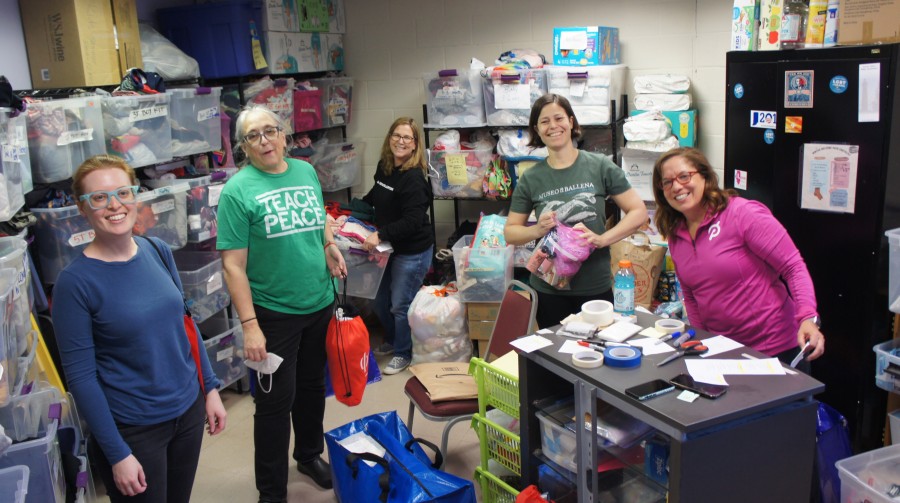For the last year, an army of volunteers has been standing behind migrants arriving in Chicago
Frenzied scenes at police stations where migrants were staying one year ago motivated a network of volunteers across Chicago that persists today.
By Adriana Cardona-Maguigad

For the last year, an army of volunteers has been standing behind migrants arriving in Chicago
Frenzied scenes at police stations where migrants were staying one year ago motivated a network of volunteers across Chicago that persists today.
By Adriana Cardona-MaguigadWhen Patricia Buenrostro first spotted migrants staying at a Chicago police station in the Austin neighborhood a year ago, the college professor wanted to help.
“[People] needed blankets. They were staying outside. It was April and … still cold,” Buenrosto said in Spanish. “I told my husband, ‘Let’s bring them some covers.’ ”
Buenrostro’s husband, Ignacio Becerril, migrated from Mexico when he was a teenager so she understands the challenges many immigrants face starting a new life in the United States. The couple not only brought blankets, but they took migrants to shower at a nearby church and even housed some in their Southwest Side brick home for a few months.
Buenrostro is one of thousands of volunteers who have raised their hands to help. More than 40,000 migrants have arrived in Chicago since 2022. But a year ago there was an alarming surge of asylum seekers being bused or flown to Chicago almost daily, mostly from Texas.
City officials sent families to police stations as they ran out of shelter space. People slept on floors or camped outside and didn’t have access to showers. This chaos – with parents and children in need of food, clothing and water – marked a turning point in the humanitarian crisis and activated volunteers. Last April kicked off a more unified grassroots volunteer movement that evolved into a fundamental safety net for newcomers.
The frenzied scenes at police stations motivated volunteers – mostly women like Jennie Kim. She lives near the South Loop district police station and got involved out of a desire not only to help migrants, but also to help coordinate donations.
“Wow. Yeah, April, it was completely insane,” Kim recalled. “People were dumping off donations all the time. Some volunteers started to buy food from restaurants and donate garbage bags of clothing.”
As migrants gradually moved into city-run shelters, they were only allowed to take one bag per person, so many donations were left behind.
Kim listened to experienced mutual aid volunteers, leading her and many others to create mutual aid subgroups at each police station. They used WhatsApp chats and Facebook groups to communicate. They stayed in touch with city officials regarding daily headcounts, and created Google spreadsheets to keep track of donations and migrants’ needs.
More than 20 unofficial mutual aid groups banded together and became known as: Police Station Response Team or PSRT. Each team had a police district number and a leader. Kim was a leader at PSRT District 1.
There were countless challenges. Communication with shelter staff and city officials has been difficult at times, and some volunteers say there are many aspects that can improve, including creating a unified front when advocating for migrants or demanding greater access to volunteers in shelters.
Since Chicago moved all migrants into city-run shelters, the response team efforts have morphed into a bigger network. Last fall, volunteers created a resource group on Facebook called ChiWelcome with more than 4,000 members. Volunteers say communication with specific response team members is often reactivated when there is an emergency and migrants need assistance in different parts of the city.
Today, volunteers continue to connect newcomers with resources, including medical services and assistance with school enrollment. They’ve raised thousands of dollars and have coordinated support with local churches and nonprofits.
Eleanor Kane started volunteering last fall at the District 19 police station near Wrigley Field. The database she created keeps track of migrants arriving at the American Islamic College city shelter on the North Side. Her cell phone number has been passed around through word of mouth.
“I can see exactly where every piece of help is going,” Kane said. “We are sourcing the donations, and we are sorting them and getting them into the hands of the person who needs it.”
Kane has two children and volunteers while they are at school or when she is off work. She goes to the Broadway United Methodist Church to help arrange basic needs kits based on the information she has collected. The kits include a change of clothes, underwear, gloves, scarfs, and toiletries.
She puts herself in the shoes of a migrant mother.
“They’ve arrived to this new and foreign place, and they’re trying to get their feet under them,” Kane said. “I think about what drives a mom to leave where she is, and to undertake this really scary journey to get here.”
If you are interested in becoming a mutual aid volunteer in your community, contact these groups:
ChiWelcome
This is a resource page for volunteers looking to support newly arrived migrants in shelters with basic needs and resource referrals.
https://www.facebook.com/groups/chiwelcome
Refugee Community Connections
https://www.facebook.com/groups/152284822064409/
This is a resource page for volunteers looking to assist migrants, refugees and other immigrants who are transitioning into permanent housing.
Adriana Cardona-Maguigad covers immigration for WBEZ. Follow her on X @AdrianaCardMag.
